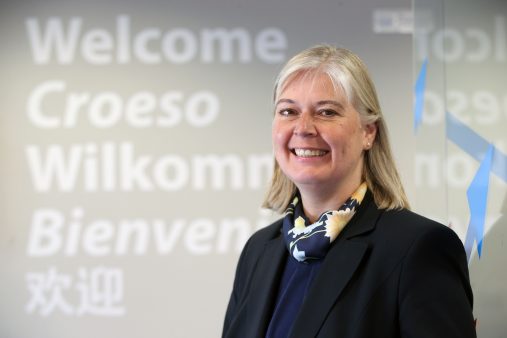Top awards for international researcher mobility
3 March 2016
Looking through the list of awards to Cardiff University from the Horizon 2020 programme, I was delighted to see four new European Fellowships awarded from the 2015 call for Marie Skłodowska-Curie Individual Fellowships – very prestigious two-year research fellowships for internationally mobile researchers. The School of Physics and Astronomy scored a hat trick with three European Fellowships, whilst the School of Chemistry was also awarded one, with another two still tantalisingly close on the reserve list.
Dr Sarah Ragan and Dr Mattia Negrello are joining the Astronomy and Astrophysics group of the School of Physics and Astronomy. Dr Ragan is currently at the University of Leeds, having spent five years prior to that at the Max Planck Institute for Astronomy in Heidelberg. Dr Negrello is joining Cardiff University from the National Institute for Astrophysics in Padova. Dr Juan Pereiro Viterbro has recently joined the Condensed Matter and Photonics group at the School of Physics and Astronomy from the University of California in San Diego, whilst Dr Joseph Beames has joined the Spectroscopy and Dynamics section of the School of Chemistry from the University of Pennsylvania. My congratulations to all the new Fellows on winning such competitive awards!
Cardiff University has benefited enormously from the European Union’s Marie Curie – and now Marie Skłodowska-Curie – programme, with many ‘Marie Curie alumni’ amongst our staff. First launched in 1996 as a mobility scheme, it provided financial support to young researchers wanting to experience a different research environment and boost their career development through a period of work in another European country. The programme now has an annual budget of €800 million and covers a variety of funding schemes – Individual Fellowships, PhD Training Networks, staff exchange projects, COFUND – but with international mobility still firmly as its underlying key principle. What also makes the programme very popular (and competitive!) is its ‘bottom-up’ approach. All disciplines and domains of research and innovation – from fundamental research to market take-up and innovation services – are covered, with no pre-defined call topics or ring-fenced disciplinary budgets.
The current trend in the programme is to increase participation by the non-academic sector, which is something all new applicants need to be aware of. On that subject, the University is very fortunate to host the only UK stop of a Europe wide campaign to promote business-academic collaborations under the Marie Skłodowska-Curie Actions on Friday, 18 March 2016. Whilst the main objective of the event is to encourage more involvement from the private sector in the programme, the line-up of expert speakers from the European Commission, large industry, SMEs, public sector and academia is guaranteed to deliver an insightful programme, exploring the theme of bridging business and research more widely. The event is free to attend but registration is required and places are limited. Please register at: https://mscabusiness.teamwork.fr/
- June 2024
- May 2024
- April 2024
- February 2024
- January 2024
- December 2023
- November 2023
- October 2023
- September 2023
- August 2023
- July 2023
- June 2023
- May 2023
- April 2023
- March 2023
- February 2023
- January 2023
- December 2022
- November 2022
- October 2022
- September 2022
- August 2022
- July 2022
- June 2022
- May 2022
- April 2022
- March 2022
- February 2022
- January 2022
- December 2021
- November 2021
- October 2021
- September 2021
- August 2021
- July 2021
- June 2021
- May 2021
- April 2021
- March 2021
- February 2021
- January 2021
- December 2020
- November 2020
- October 2020
- September 2020
- August 2020
- July 2020
- June 2020
- May 2020
- April 2020
- March 2020
- February 2020
- January 2020
- December 2019
- November 2019
- October 2019
- September 2019
- August 2019
- July 2019
- May 2019
- April 2019
- March 2019
- February 2019
- January 2019
- December 2018
- November 2018
- September 2018
- July 2018
- June 2018
- May 2018
- April 2018
- March 2018
- February 2018
- January 2018
- December 2017
- November 2017
- October 2017
- September 2017
- August 2017
- July 2017
- June 2017
- May 2017
- April 2017
- March 2017
- February 2017
- January 2017
- December 2016
- November 2016
- October 2016
- September 2016
- August 2016
- July 2016
- June 2016
- May 2016
- April 2016
- March 2016
- February 2016
- January 2016
- December 2015
- November 2015
- October 2015
- September 2015
- August 2015
- July 2015
- June 2015
- May 2015
- April 2015
- March 2015
- February 2015
- January 2015
- December 2014
- November 2014
- October 2014
- September 2014